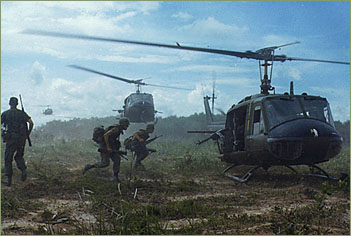 |
 |
 |
||||
 |
 |
||||
 |
|||||
 |
|||||
 |
Over the next three years, the president took a two-track approach: he brought home troops by the tens of thousands, announcing to the nation another withdrawal every few months. At the same time, he ordered intense bombing campaigns over North Vietnam and covert attacks and incursions into neighboring Cambodia and Laos, which he often tried to hide from the American public. Richard Nixon and his national security advisor, Henry Kissinger, knew they could not win the war, says Historian Mel Small, author of The Presidency of Richard Nixon. But they hoped strategic military escalation would help the US gain concessions from the North Vietnamese -- and shore up the South Vietnamese -- as the United States pulled out of the war. Their "Vietnamization" plan also included giving South Vietnam on-going political direction and economic aid so that the South eventually could fend off the North on its own. By spring of 1972, a half-million American troops had come home. There were about 60,000 left when North Vietnam unleashed a massive assault on South Vietnam on March 30 of that year. The attack infuriated Nixon, who felt the North Vietnamese were taking advantage of the troop withdrawal just as the war was supposed to be winding down. This time, Nixon decided to go on the counter-offensive. He chose a military tactic that both he and President Lyndon Johnson had contemplated over the course of the war: mining North Vietnam's harbors to block war supplies being shipped from the Soviet Union and other Eastern Bloc countries. Mining was always considered a dangerous escalation of the war. Because the ships most likely to get blown up belonged to the Soviets, a mine explosion could trigger a direct confrontation with them. Most of Nixon's advisors opposed mining because they believed it would jeopardize the president's plans for a peace-making summit in Moscow, scheduled to occur just two weeks after the mines were dropped into sea by American war planes. But Nixon was determined to punish the North Vietnamese and willing to take his chances with the U.S.S.R.. He knew the Soviets were eager to solidify a policy of detente with the United States, especially after Nixon opened relations with communist China - a Soviet enemy - in early 1972. Nixon wagered that the Soviet Union would complain about the mining, but stick with the summit. On Monday night, May 8, 1972, Nixon met first with Congressional leaders, and then went on national television, to explain his decision to mine the Hanoi and Haiphong harbors and intensify bombing over North Vietnam. He also reiterated U.S. terms for a peace agreement. Privately, he was determined to bring North Vietnam to its knees. Nixon wrote in a memo later that evening: "I cannot emphasize too strongly that I have determined that we should go for broke…Needless to say, indiscriminate bombing of civilian areas is not what I have in mind. On the other hand, if the target is important enough, I will approve a plan that goes after it even if there is a risk of some civilian casualties. We have the power. The only question is whether we have the will to use that power. What distinguishes me from Johnson is that I have the will in spades."
Next: part 2 | ||||
